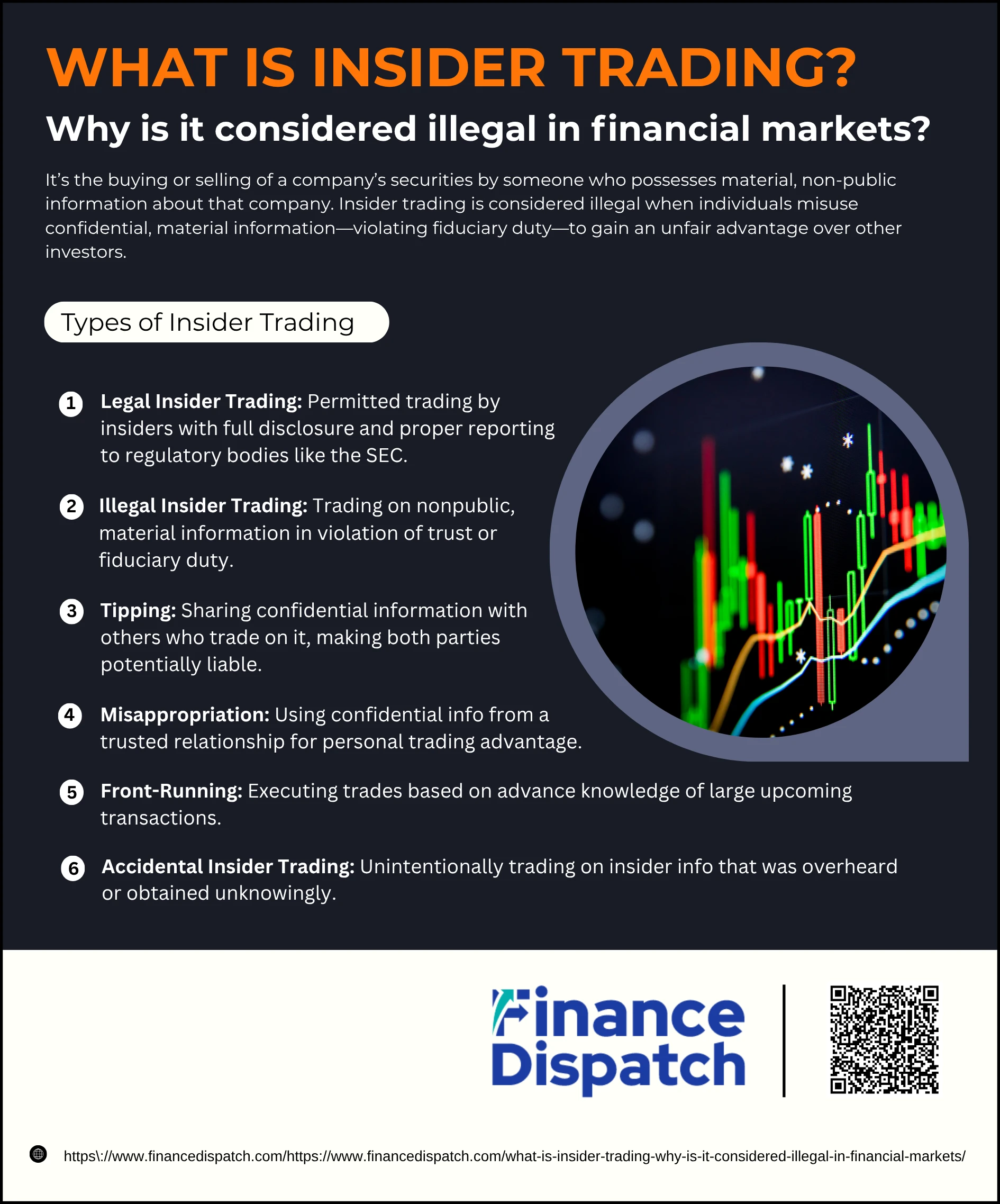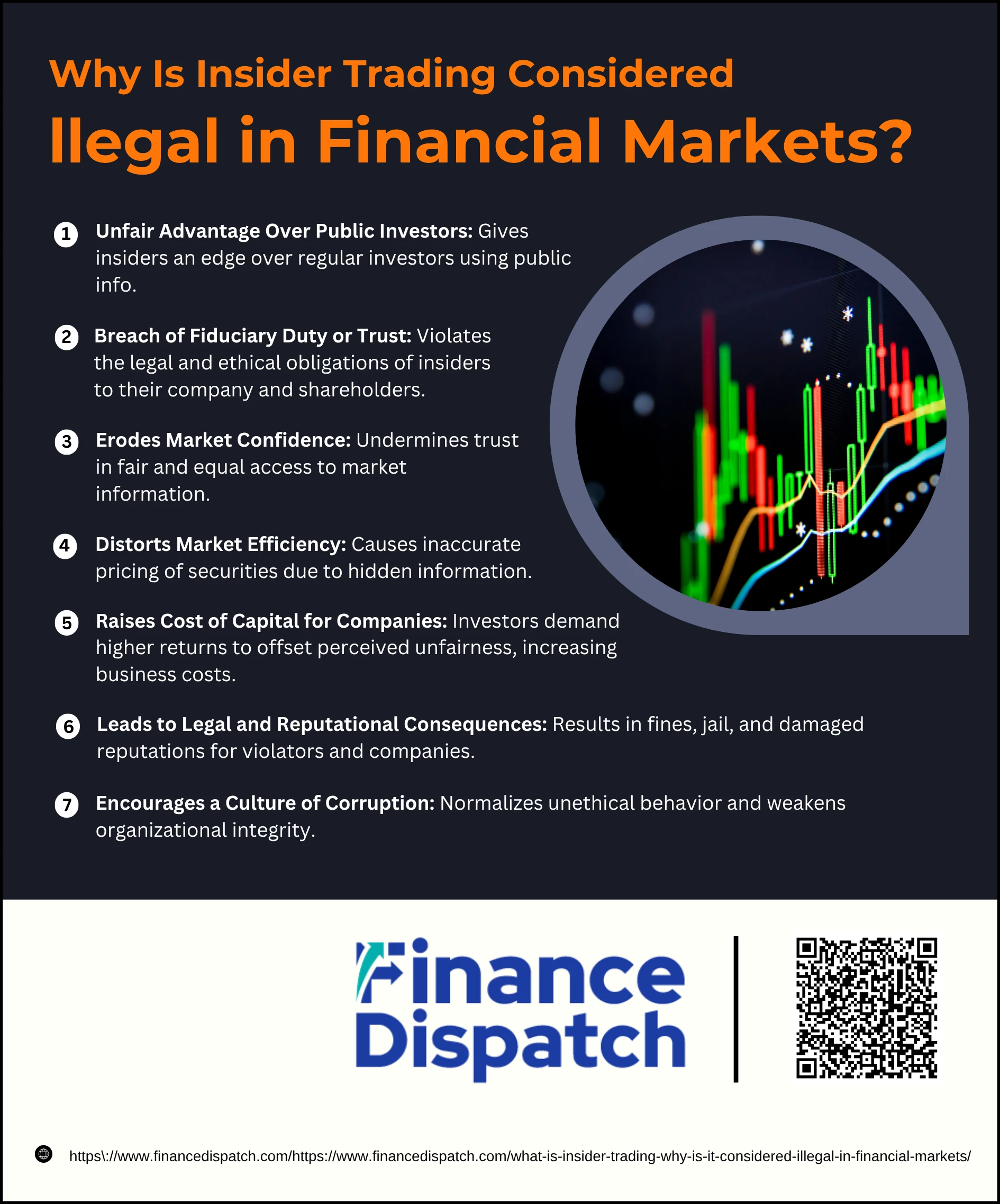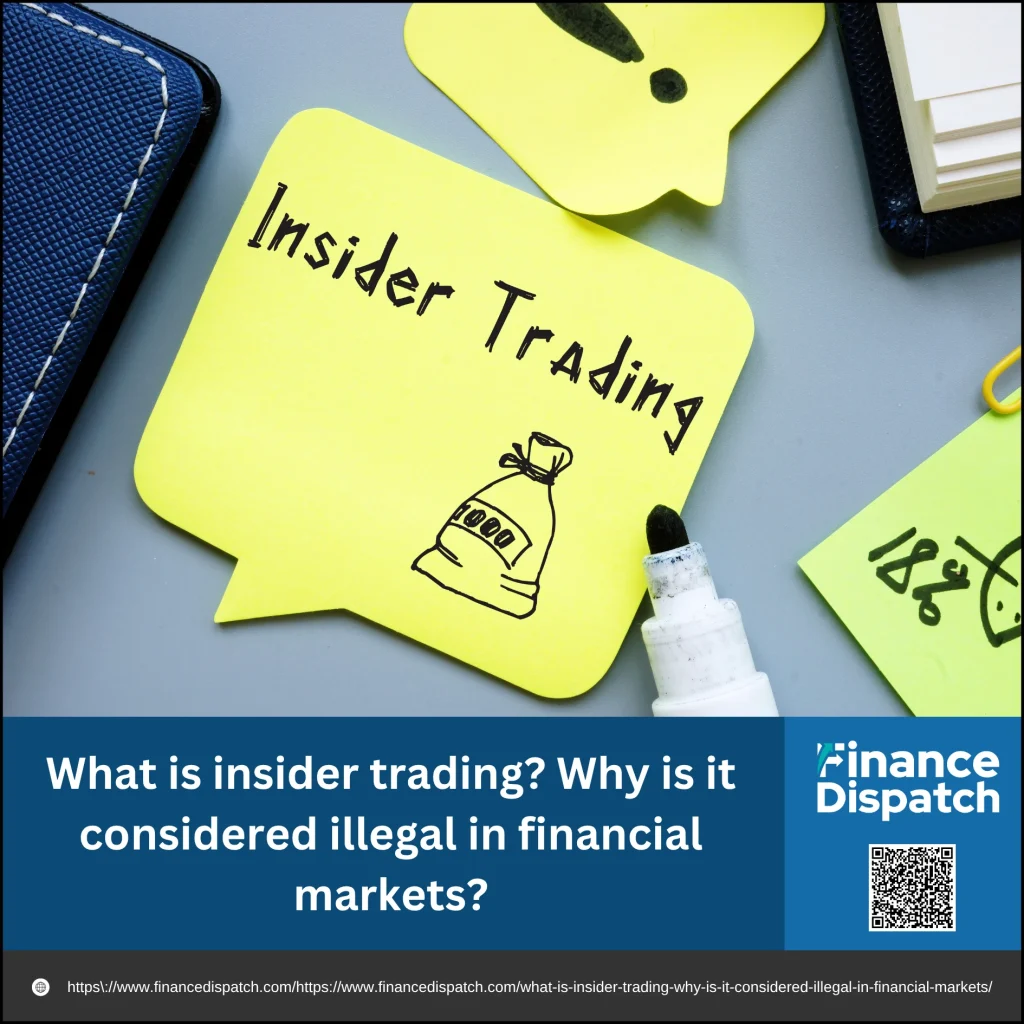Insider trading is one of the most debated and closely monitored practices in the financial world. At its core, it involves buying or selling a company’s securities based on material information that has not been made available to the public. While some forms of insider trading are legal when properly disclosed and regulated, others cross ethical and legal boundaries—resulting in criminal charges, fines, and damaged reputations. Understanding what constitutes insider trading is essential not only for investors and professionals but also for anyone who participates in the financial markets. More importantly, knowing why insider trading is considered illegal reveals how such actions undermine fairness, erode public trust, and distort the very foundation of free and transparent markets.
What Is Insider Trading?
Insider trading refers to the act of buying or selling a publicly traded company’s securities—such as stocks or bonds—based on material, nonpublic information about the company. This information is typically known only to individuals within or closely connected to the organization, such as executives, directors, employees, consultants, or significant shareholders. The key elements that define insider trading are the possession of confidential information that could influence investment decisions and the use of that information for personal gain before it becomes public. While not all insider trading is illegal—some is permitted when disclosed and conducted within regulatory guidelines—trading on privileged information without proper disclosure violates securities laws and is considered both unethical and unlawful.
 Types of Insider Trading
Types of Insider Trading
Insider trading is not always a black-and-white issue. It can be both legal and illegal, depending on how, when, and by whom the trade is conducted. The distinction lies in whether the trade was made using material, nonpublic information and whether it breached a duty of trust or confidence. Understanding the various types of insider trading is essential for recognizing which practices comply with the law and which violate it.
1. Legal Insider Trading
This occurs when insiders—such as executives, directors, or significant shareholders—buy or sell company stock and properly report their trades to regulatory bodies like the U.S. Securities and Exchange Commission (SEC). These trades are transparent and follow rules that prevent abuse of privileged information.
2. Illegal Insider Trading
This involves trading based on material, nonpublic information in violation of a fiduciary duty or other trust relationship. It can be carried out by company insiders or outsiders who receive tips from them. Using such information to gain an unfair advantage in the market is illegal and punishable by law.
3. Tipping
Tipping refers to the act of sharing nonpublic, material information with someone else who then trades on it. Both the tipper and the tippee can be held liable if the tipper received a benefit or breached a duty of confidentiality.
4. Misappropriation
In this type, a person misuses confidential information obtained through a trusted relationship—such as an attorney, consultant, or friend of an insider—to make trades for personal gain. It breaches a duty owed to the source of the information, not necessarily the company itself.
5. Front-Running
Front-running occurs when a broker or insider executes trades based on knowledge of upcoming large transactions by clients or the firm. It is considered unethical and, in many jurisdictions, illegal.
6. Accidental Insider Trading
Sometimes individuals unknowingly trade based on insider information—for example, by overhearing sensitive information in a public setting. Even if unintentional, these trades can still result in legal consequences if the trader should have known the information was nonpublic and material.
Key Elements of Illegal Insider Trading
Illegal insider trading occurs when someone buys or sells securities while in possession of material, nonpublic information and does so in violation of a duty of trust or confidence. This type of trading undermines market fairness, giving certain individuals an unfair advantage over the general public. Regulators such as the SEC and SEBI closely monitor trading activity for signs of such misconduct. To identify illegal insider trading, several key elements must be present.
1. Insider Status: The person trading must be an insider or someone who received confidential information from an insider—this includes executives, employees, consultants, lawyers, or friends and relatives of insiders.
2. Material Information: The information used must be significant enough to influence an investor’s decision to buy or sell securities, such as merger plans, earnings reports, or regulatory approvals.
3. Nonpublic Nature: The information must not be available to the general public at the time of the trade. It must be exclusive and confidential.
4. Breach of Duty: The trader must have breached a fiduciary duty or relationship of trust, either by trading themselves or by tipping others.
5. Use of Information: There must be a clear link between the confidential information and the trading activity—meaning the person traded because of the information, not for unrelated reasons.
6. Intent (Scienter): The act must involve intent to defraud, deceive, or manipulate, although in some jurisdictions, negligence may also trigger liability.
 Why Is Insider Trading Considered Illegal in Financial Markets?
Why Is Insider Trading Considered Illegal in Financial Markets?
Insider trading is considered illegal because it undermines the fairness, transparency, and integrity that financial markets rely on. When individuals use confidential, material information that is not available to the public for personal financial gain, they violate principles of equality and trust. This creates a market where only the well-connected win, while ordinary investors face losses due to factors beyond their control. Such practices damage investor confidence, increase the cost of capital for companies, and encourage unethical corporate cultures. Below are the key reasons why insider trading is viewed as a serious offense in financial markets.
1. Unfair Advantage Over Public Investors
Insider trading allows individuals with privileged access—like executives or close associates—to act on information before it becomes public. This gives them an edge over regular investors who make decisions based on public news and filings, making the system fundamentally unfair.
2. Breach of Fiduciary Duty or Trust
Corporate insiders and professionals have a duty to act in the best interest of their company and shareholders. When they use confidential information for personal benefit or pass it to others, they break that trust, violating legal and ethical responsibilities.
3. Erodes Market Confidence
Public faith in markets depends on the belief that everyone trades on the same information. If people suspect that some participants have unfair advantages, they may withdraw from investing altogether, harming overall market participation.
4. Distorts Market Efficiency
Financial markets rely on the free flow of public information to accurately price securities. When insider trading distorts this process, prices may not reflect a company’s true value, causing confusion, mispricing, and inefficient capital allocation.
5. Raises Cost of Capital for Companies
If investors believe they are at a disadvantage due to insider trading, they may demand higher returns on their investments. This, in turn, raises borrowing and fundraising costs for companies and stifles business growth.
6. Leads to Legal and Reputational Consequences
Penalties for illegal insider trading are severe. Offenders can face millions in fines, jail sentences of up to 20 years, and permanent bans from the securities industry. Companies involved in such scandals also face long-term reputational harm.
7. Encourages a Culture of Corruption
Allowing insider trading to go unchecked fosters an environment where misuse of confidential information is normalized. This can spread unethical practices across the organization and damage employee morale and public trust.
Legal vs. Illegal Insider Trading
Insider trading is not inherently unlawful—its legality depends on how and when the trade is executed, and whether it complies with disclosure rules. Legal insider trading occurs when corporate insiders like executives or directors buy or sell shares of their own company and properly report these transactions to regulatory authorities such as the U.S. Securities and Exchange Commission (SEC). In contrast, illegal insider trading involves trading based on material, nonpublic information in violation of a duty of trust or confidentiality. The distinction is crucial in understanding what practices are acceptable in the financial markets and which ones are punishable by law.
Comparison Table: Legal vs. Illegal Insider Trading
| Aspect | Legal Insider Trading | Illegal Insider Trading |
| Definition | Buying or selling securities by insiders with full disclosure and in accordance with rules | Trading based on confidential, material information not available to the public |
| Information Used | Publicly available or non-material information | Material, nonpublic (confidential) information |
| Disclosure Requirement | Must be reported to regulatory bodies (e.g., via SEC Form 4 in the U.S.) | No disclosure—trades are typically concealed |
| Who Can Commit | Company officers, directors, employees following legal protocols | Insiders, friends, family, consultants, or anyone who receives inside information improperly |
| Legal Status | Permitted and transparent | Prohibited and punishable by law |
| Examples | CEO buys shares during an open trading window and files disclosure with the SEC | Employee sells stock after learning about an undisclosed merger |
| Consequences | None if all rules are followed | Fines, imprisonment, disgorgement of profits, industry bans |
Real-Life Examples of Insider Trading
Insider trading isn’t just a theoretical or regulatory concern—it has occurred numerous times in real markets, involving high-profile individuals, large corporations, and even government insiders. These real-life cases highlight how misuse of confidential information for financial gain can lead to legal action, reputational damage, and severe penalties. Here are some notable examples of insider trading that have made headlines and shaped enforcement practices around the world:
1. Martha Stewart and ImClone (2001–2004)
Media mogul Martha Stewart sold her shares in ImClone Systems based on a tip that the company’s cancer drug would be rejected by the FDA. Though she was not charged with insider trading directly, she was convicted of obstruction of justice and lying to investigators.
2. Raj Rajaratnam – Galleon Group (2009)
Rajaratnam, a hedge fund billionaire, was convicted of orchestrating a vast insider trading network involving tips from insiders at IBM, Intel, and McKinsey & Co. He earned about $60 million in illegal profits and was sentenced to 11 years in prison.
3. Joseph Nacchio – Qwest Communications (2007)
The former CEO sold $50 million worth of stock while knowing the company was in serious financial trouble. He was found guilty of insider trading and sentenced to six years in prison.
4. Yoshiaki Murakami – Livedoor/Nippon Broadcasting (2006)
This Japanese fund manager made $25.5 million by acting on nonpublic information about Livedoor’s plans to acquire a stake in Nippon Broadcasting. He was found guilty and fined heavily.
5. Reliance Industries (India, 2007)
SEBI banned Reliance Industries from derivatives trading for a year and fined the company for manipulating stock prices by trading in violation of legal limits and rules.
Penalties for Insider Trading
Insider trading is a serious offense with strict legal consequences in most jurisdictions. Regulatory bodies such as the U.S. Securities and Exchange Commission (SEC), India’s SEBI, and the UK’s FCA impose harsh penalties to deter individuals and organizations from misusing confidential information for financial gain. These penalties are designed to uphold market integrity and protect investors by punishing those who breach the trust and fairness essential to public markets. Both civil and criminal actions can be taken, often resulting in long-term professional and personal consequences.
Common Penalties for Insider Trading
1. Hefty Fines
Individuals may face fines up to $5 million in the U.S., while companies can be fined up to $25 million. In India, SEBI can impose penalties up to INR 250 crore or three times the profit gained.
2. Imprisonment
Convicted individuals may face prison terms of up to 20 years depending on the severity of the offense and the jurisdiction.
3. Disgorgement of Profits
Offenders are often required to return any profits earned from the illegal trades, along with interest.
4. Bans from Securities Markets
Violators can be barred from working in the securities industry or serving as a corporate officer or director.
5. Reputational Damage
Insider trading convictions can ruin professional reputations and lead to loss of employment, business partnerships, and public trust.
6. Civil Lawsuits
In addition to government action, companies or investors harmed by insider trading can file civil lawsuits for damages.
How Regulators Detect and Prevent Insider Trading
Regulators such as the U.S. Securities and Exchange Commission (SEC), the Securities and Exchange Board of India (SEBI), and the Financial Conduct Authority (FCA) in the UK employ a range of sophisticated tools and strategies to detect and prevent insider trading. They monitor trading activity for unusual patterns—such as sudden price movements or spikes in volume before major announcements—that may suggest misuse of confidential information. Advanced analytics, algorithmic surveillance, and data-matching techniques help uncover links between traders and insiders. Regulators also rely on whistleblower programs that encourage employees and market participants to report suspicious behavior anonymously. To prevent insider trading proactively, many companies implement internal controls such as pre-clearance of trades, blackout periods, insider lists, and employee education programs. Together, these efforts aim to promote transparency, protect investor trust, and maintain the fairness and integrity of financial markets.
Best Practices to Avoid Insider Trading
Avoiding insider trading requires proactive steps from both individuals and organizations. Since even unintentional misuse of confidential information can lead to serious legal consequences, establishing clear policies and maintaining a culture of compliance are essential. By adopting best practices, companies can minimize risk, protect their reputation, and ensure fair participation in the financial markets. Below are some widely recommended measures to prevent insider trading:
1. Establish a Clear Insider Trading Policy
Create and communicate a formal policy outlining what constitutes insider trading, the types of information considered sensitive, and the procedures for reporting and compliance.
2. Implement Trading Blackout Periods
Restrict trading during sensitive times—such as before earnings reports, mergers, or major announcements—to reduce the risk of improper information being used.
3. Require Pre-Trade Approvals
Insiders and key employees should seek written approval before executing any trades in company securities, adding a layer of oversight.
4. Maintain and Monitor Insider Lists
Keep accurate records of individuals with access to material nonpublic information, and regularly update the list to track who may be subject to trading restrictions.
5. Conduct Regular Employee Training
Educate employees—especially new hires and those in sensitive roles—on insider trading laws, examples of violations, and consequences of non-compliance.
6. Use Surveillance and Analytics Tools
Employ software that monitors trading patterns and flags suspicious activity based on timing, volume, or insider access.
7. Encourage Whistleblower Reporting
Provide anonymous reporting channels for employees to raise concerns about potential insider trading without fear of retaliation.
8. Conduct Periodic Compliance Audits
Review trading records, approval logs, and insider lists regularly to ensure adherence to policies and identify potential risks.
Conclusion
Insider trading, when conducted illegally, poses a significant threat to the integrity and fairness of financial markets. While trading by corporate insiders is not always unlawful, the misuse of confidential, market-moving information for personal gain undermines public trust, disadvantages everyday investors, and distorts the natural flow of capital. Through clear regulations, strict penalties, and proactive compliance measures, regulators aim to deter such behavior and uphold transparency. For companies and individuals alike, understanding the boundaries of legal and illegal insider trading—and adhering to best practices—is essential not only to avoid legal consequences but also to maintain a fair and trustworthy market environment for all participants.



